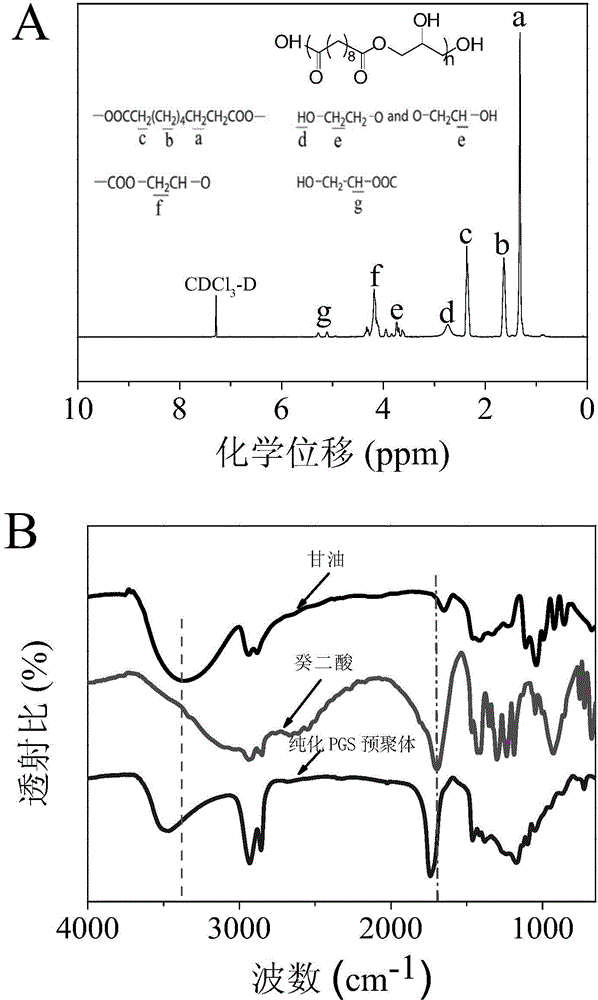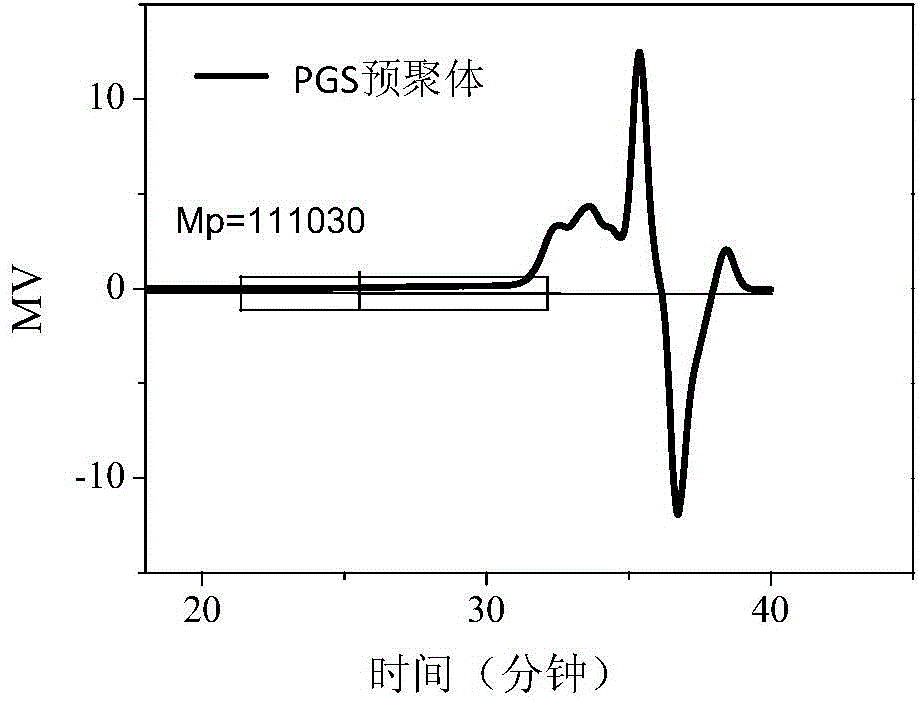Beta-TCP/PGS composite scaffold and preparation method and application thereof
A composite stent and porous stent technology, which can be used in pharmaceutical formulations, medical preparations with non-active ingredients, medical science, etc., can solve the problems of limited improvement in β-TCP toughness and strength, poor toughness, and the influence of β-TCP on biological activity. , to achieve the effect of promoting vascularization, rapid repair, and promoting bone repair
- Summary
- Abstract
- Description
- Claims
- Application Information
AI Technical Summary
Problems solved by technology
Method used
Image
Examples
Embodiment 1
[0104] Synthesis and Purification of PGS Prepolymer
[0105] PGS prepolymers are synthesized by a two-step process.
[0106] Step 1: Under an argon atmosphere, react sebacic acid and glycerin at a molar ratio of 1:1 at 130°C for 24 hours;
[0107]The second step: the product of the first step was continued to react for 24 hours at 130° C. under vacuum conditions to obtain a PGS prepolymer.
[0108] Purification is then carried out. Firstly, the PGS prepolymer is dissolved in ethanol, the obtained emulsion is allowed to stand for a period of time, and the supernatant liquid is poured off. The obtained PGS prepolymer was placed in a dialysis bag and dialyzed to obtain a purified PGS prepolymer with a molecular weight of 12000 Da and a dispersion coefficient of 1.19.
[0109] Purification of PGS prepolymer 1 H-NMR such as figure 1 Shown in A. The proton peaks at 1.31, 1.62 and 2.35ppm mainly indicate the presence of sebacic acid units in the synthesized polymer chains, and t...
Embodiment 2
[0113] Synthesis of β-TCP Nanoparticles and Preparation of β-TCP Porous Scaffold
[0114] 0.4mol Ca(NO 3 ) 2 4H 2 O and 0.4mol(NH 4 ) 2 HPO 3 Dissolve in 200ml ultrapure water respectively, and stir rapidly for 30min to obtain Ca salt and P salt solutions. Add the Ca solution to the P solution drop by drop (1-2 drops / second), while maintaining constant stirring and adding the prepared ammonia water (2M) to adjust the pH value of the mixed solution to be stable at 7.0-7.5. After the dropwise addition was completed, the stirring was stopped, and the solution was allowed to stand for 2 hours to allow the solution to precipitate naturally, and the supernatant liquid was poured off. Then put the obtained precipitate into a centrifuge bottle, carry out centrifugation (6000r / min, 10min), wash with ultrapure water in the next step, ultrasonic (10min), continue to centrifuge, then repeat the water wash 2 times, and then wash it again with absolute ethanol After centrifugation, t...
Embodiment 3
[0121] Preparation of β-TCP / 10P-Unc Porous Scaffold
[0122] The prepared PGS prepolymer (PGS-1:1, prepared in Example 1) was formulated into a solution with a concentration of 10 mg / ml using absolute ethanol as a solvent. Place the β-TCP porous scaffold (0.2 g in weight) in a 24-well plate, add 2 ml of PGS solution to completely submerge the scaffold, and then place the porous plate in a fume hood for 3 to 5 hours to remove ethanol. Then the scaffold was freeze-dried at -50° C. under vacuum conditions for 24 hours to obtain the product β-TCP / 10P-Unc porous scaffold. The size of the pores is between 300-500 microns. The porosity is 90±2%. The maximum compressive strength is 0.02±0.01MPa, and the fracture deformation is 120±32%.
PUM
| Property | Measurement | Unit |
|---|---|---|
| Average pore size | aaaaa | aaaaa |
| The average particle size | aaaaa | aaaaa |
| Concentration | aaaaa | aaaaa |
Abstract
Description
Claims
Application Information
 Login to View More
Login to View More - R&D
- Intellectual Property
- Life Sciences
- Materials
- Tech Scout
- Unparalleled Data Quality
- Higher Quality Content
- 60% Fewer Hallucinations
Browse by: Latest US Patents, China's latest patents, Technical Efficacy Thesaurus, Application Domain, Technology Topic, Popular Technical Reports.
© 2025 PatSnap. All rights reserved.Legal|Privacy policy|Modern Slavery Act Transparency Statement|Sitemap|About US| Contact US: help@patsnap.com



